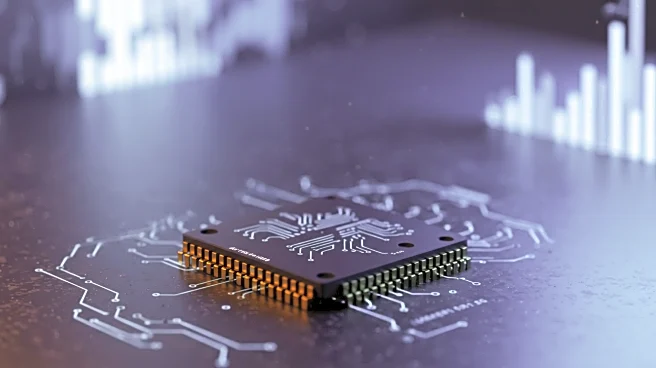What's Happening?
The Trump administration is reportedly considering acquiring a 10% stake in Intel, which could make the U.S. government the largest shareholder in the chipmaker. This potential deal involves converting some or all of Intel's grants from the 2022 U.S. CHIPS and Science Act into equity. Intel has received approximately $10.9 billion in CHIPS Act grants, aimed at supporting domestic investment and semiconductor manufacturing for national security. The news of a possible government investment initially led to a 9% rally in Intel's shares. However, it remains uncertain if the proposal has gained traction within the administration or if discussions have occurred with affected companies. Intel and the White House have not responded to inquiries regarding the report.
Why It's Important?
The potential acquisition of a stake in Intel by the Trump administration underscores the strategic importance of semiconductor manufacturing to national security and economic competitiveness. Intel, once a leader in the U.S. chip industry, has fallen behind global competitors, prompting efforts to revitalize its position. The CHIPS Act, passed with bipartisan support, allocated $39 billion in grants to bolster American semiconductor projects. A government stake in Intel could signal a shift towards building government-backed national champions in strategic industries. This move may impact the semiconductor industry, influencing investment strategies and competitive dynamics.
What's Next?
If the Trump administration proceeds with acquiring a stake in Intel, it could lead to renegotiations of the CHIPS Act grants and alter the capital infusion into the company. The administration's interest in strategic industries may prompt further government involvement in other sectors. Stakeholders, including lawmakers and industry leaders, may react to this development, potentially influencing policy decisions and investment strategies. The outcome of these discussions could shape the future of U.S. semiconductor manufacturing and its global competitiveness.
Beyond the Headlines
The consideration of a government stake in Intel raises questions about the role of government in private industry and the balance between public and private interests. It may trigger debates on the ethical implications of government ownership in strategic sectors and the long-term impact on innovation and competition. Additionally, this development could influence international perceptions of U.S. industrial policy and its approach to national security.










